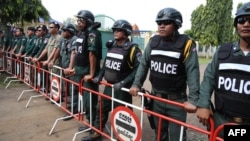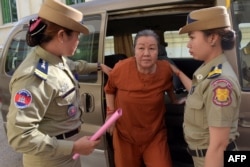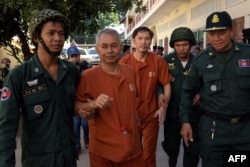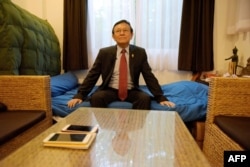In March 2016, a series of tapes emerged that appeared to show Cambodian opposition leader Kem Sokha speaking with his mistress, a 23-year-old hairdresser named Khom Chandaraty.
The scandal would quickly pull in one of the largest human rights groups in the country, ADHOC, sending five senior officials to prison and miring the organization in legal battles for years to come. The Supreme Court ruled against the “ADHOC five” in November 2022, more than six years after the tapes first emerged.
The American Bar Association’s Center for Human Rights released a report in June analyzing the trial from beginning to end — and found it failed to meet national legal standards and Cambodia’s international human rights commitments on multiple fronts.
Coming in the broader context of a crackdown on independent institutions — from the media to apolitical nonprofits and advocacy groups — the legal saga likely had its desired impact, the ABA report concludes.
“The charges against the ADHOC Five have left a lasting wound on ADHOC as an organization as the Cambodian Government has achieved its potential goal of effectively silencing a critical voice whilst at the same time sending a threat to other civil society organizations of what could happen to them should they cross the Government’s perceived red line,” it said.
Chin Malin, a secretary of state and Justice Ministry, told VOA Khmer the ABA report was a “copy-paste” job from a group that was sympathetic to ADHOC.
“Their conclusion is not based on legal aspects and procedures of Cambodia,” Chin Malin said. “They also failed to look at the activities of those people, why they were accused...they don’t care about what evidence the authorities have.”
The case against ADHOC largely revolved around $204 the group gave to Chandaraty and efforts to help her leave the country — both of which prosecutors said were bribes meant to influence her to deny that her voice was on the tapes.
ADHOC officials said the money and other assistance were part of their standard response to a client under duress, and that they only advised Chandaraty to be firm in her testimony, but never sought to alter what she said.
On September 26, 2018, the Phnom Penh municipal court handed down a guilty verdict and sentenced the officers — Ny Sokha, Ny Chakrya, Nay Vanda, Yi Soksan and Lim Mony — to five years in prison, suspending their remaining sentences.
The five had already been released, but only after spending 427 days in pre-trial detention, despite repeated bail requests and their detention being deemed arbitrary by the United Nations.
“This has become a worrisome trend as the Cambodian government continues to proliferate criminal charges and initiate long-running criminal proceedings against civil society actors critical of the government,” ABA said in its report.
In May 2022, the Appeal Court upheld the convictions and sentences, roundly dismissing the legal arguments from Ny Chakrya and his colleagues. And a few months later, in November, the Supreme Court would do the same.
In its analysis of the legal process, the ABA argues Cambodia’s courts violated the defendant’s right to a fair trial, freedom of association, equal protection under the law and right to avoid arbitrary detention.
The report points to public statements from judicial officials and an investigating judge stating the ADHOC Five were guilty of crimes, long before any verdict had been handed down. And it says their prolonged detention and delayed trial failed to meet legal requirements for such extraordinary treatment.
It also notes the whole case revolved around testimony Khom Chandaraty supposedly gave to the investigating judge. In that conversation, according to the judge, she claimed that she told two of the ADHOC staffers — Nay Vanda and Yi Soksan — that she had really had an affair with Kem Sokha and the voice in question was hers, but that she told police a different story due to pressure from the staffers.
However, defense lawyers were never able to question or cross-examine her about the statements. And the report argues prosecutors failed to meet the standard of “beyond a reasonable doubt” in proving their case.
“Even assuming Chandaraty’s evidence is truthful, actual knowledge could be imparted to only two of the accused,” Nay Vanda and Yi Soksan, and there was no evidence that those two had informed the other three defendants of the conversation, the report says.
“It is difficult to see how Khom Chandaraty’s testimony before the investigative judge could be considered so credible on its own as to establish an essential element of the charged offense beyond reasonable doubt, particularly where the defense had not had an opportunity to test that evidence through cross-examination at trial,” it says.
The report notes that defense lawyers pushed for Khom Chandaraty to appear at hearings for cross-examination throughout the trial and appeals process, but were rebuffed. “No reasoning was provided as to why she was not properly summoned for the hearings,” it says.
Ultimately, the report summarizes, the ADHOC officials were investigated and prosecuted for providing legal and other assistance to a woman and her family who filed a request asking for that assistance from ADHOC.
“On its face, prosecution of the staff of a human rights organization for conducting ordinary human rights work following receipt of a formal request for assistance from a victim would therefore appear to be a violation of the freedom of association guaranteed” in international laws adopted by Cambodia’s government.
Spokespeople for the Phnom Penh Municipal Court could not be reached for comment.
Yi Soksan, a senior investigator at ADHOC who was among the imprisoned five, reiterated to VOA Khmer that the staffers merely sought to help Khom Chandaraty.
“I ask the courts to be independent and dare to convict the wrongdoers and rule fairly for the human rights defenders,” he said.
(additional reporting Sun Narin in Phnom Penh)









